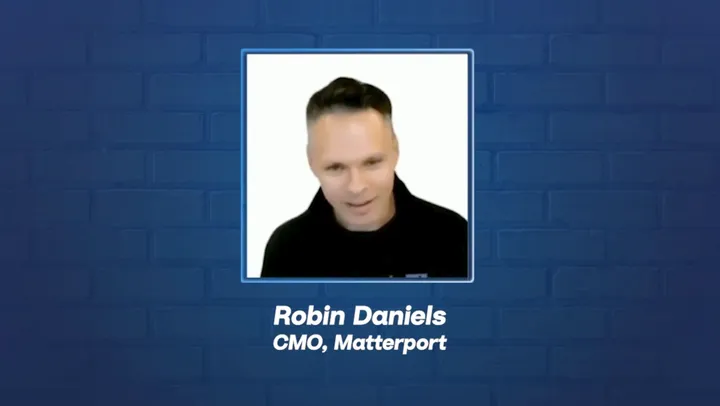In case you missed it, last week, we launched the very first episode of our ‘3 Learnings From’ series.
It’s a video podcast where we chat with leaders in marketing and communications, asking them about their biggest career learnings and insights from their current strategy.
This week, we’re talking to Robin Daniels, the CMO of Matterport! He reveals what he looks for when hiring, the essentials for investing in a brand, and how communication skills are key to a successful career.
‘A dream, a passport, and an endlessly optimistic attitude’
As a young man, Robin booked a one-way ticket from Copenhagen to San Francisco in 2000.
Being 21-years old with nothing to lose, he was determined to join the tech revolution that was bubbling in Silicon Valley. He had no job, no contacts and nowhere to stay—just a passport and a boundless sense of optimism.
Since then, Robin has picked up business and marketing experience at some of the most exciting high-growth tech companies across the US. Having held executive leadership roles at WeWork, LinkedIn, SalesForce, and Box—Robin was primed to succeed in his new role as CMO at Matterport, which he took on in early 2020.
Founded in 2011, Matterport is the go-to for 3D spatial data and cameras. Robin is leading the company’s global marketing strategy at a time of rapid growth. With 6 global offices, from San Francisco to London to Singapore, Matterport gives startups and the world’s largest companies the ability to design, operate, and understand any given space.
The all-in-one platform enables users to transform spaces into an immersive ‘digital twin’. Consumers are relying on virtual experiences now more than ever, and Matterport’s service is helping many businesses stay operational.
Robin is focused on delivering results through innovative and highly differentiated go-to-market activities, while empowering his teams to achieve new heights. With a guiding principle in his work and life that ‘people come first’, Robin continues to inspire as a marketing leader in the global tech industry.
Let’s find out what he’s learned from his incredible journey so far!
Learning #1: Take a chance on talent. Focus on grit, aptitude, hunger, and passion.
When looking to hire your next superstar, education and background aren’t everything. According to Robin, what really counts is the right attitude:
I’ve gotten to where I am in my life because somebody took a chance on me. I didn’t necessarily have a great experience, I didn’t have the best educational background, but I showed energy, grit and passion.
So when I’m hiring, I want to hire for grit, energy and passion. Something magical happens when you hire somebody who is so eager to prove themselves that they’ll go the extra mile to work their ass off, to show they can deliver results, that they can belong, that they can be part of something, that they can ultimately have a career that’s worth investing in.
When I was CMO at Vera, I interviewed with a young SDR who really wanted to get into marketing... It was obvious from that meeting that she had so much to offer and I knew that she was going to go all the way one day... But she didn’t have ‘the background’.
If I’d only gone on her background, I wouldn’t have hired her for a marketing position. But based on the stories she told me about her life, I ended up hiring her as product marketing manager and she was a game changer for the company.
Since then, I’ve always believed in taking a chance on people who just need someone to believe in them. Of course if you’re hiring for a senior position, you want to know that they have a track record of success and the leadership skills and so on.
But especially at the mid level and junior level, hire for the energy that they’re showing... they will literally walk through walls for you! It’s such a joy as a leader when you have those people who make the whole team better because of what they do.
Learning #2: Invest in brand early and often
Short-term thinking is all about ‘buying a transaction’ and demand-gen, explains Robin, but building a brand that people love will pay off in the long run:
Oftentimes marketing leaders think they have to explain the difference between revenue-generating activities and brand-generating activities. The truth is that both are related to revenue—one is just more short-term and the other is more long-term.
If you want to create a brand that people fall in love with, you have to invest in it early and often. There are three keys things that you have to do if you want to make a brand that really stands the test of time:
- It requires focus. A brand does not happen automatically, and you have to focus on creating this brand with intention: ‘we want to create a brand that stands for this’
- It requires consistency. So often, companies say ‘let’s change the brand values now, or let’s change these colors, and let’s change this or that.’ This doesn’t mean you can’t modify it at the edges, like when you go into a new country or city and you want to have a local feel, of course, but the best brands in the world have consistency.
- It requires time. Building a strong brand takes a long time, but the benefits you see are huge. For example, when Airbnb was hit by the Covid crisis, their whole business stopped almost overnight. But as the world started opening up a little again... their business just took off—and they had spent nothing on marketing. If you build a brand that people fall in love with, they will come back to you because they remember you. Airbnb had earned that right by building the brand for the long-term.
Learning #3: Communication is the key skill that will often determine if you are successful or not
Playing it tough certainly isn’t Robin’s management style. Growing a career is more about authenticity and communicating well:
When I look back over my twenty-year career, communication is what has either made me successful in some jobs, or not successful in other jobs. If you’re not communicating, then people are making up their own stories about what’s happening. So as a marketing leader, you always have to be communicating, even if there’s nothing new to communicate about!
You have to communicate to your team, to your cross-functional partners, to your CEO, to your board... communication is really everything. Learning how to make sure your message gets across in the right way is absolutely key. I’ve seen many careers fall down because people are not communicating in the right way, sometimes aggressively or combatively.
If there’s one skill that I would say made a big difference in my life, it would be communication. I think it’s so key when it comes to telling the story of your life, the story of what you want to become, the story of what you can do for the company. If you can’t communicate that, your success is going to be limited.
But communication also means how you're perceived in the company and how you’re perceived in the market. Over time you’ve got to find a voice that’s authentic to you. I’m a big believer in trying different things, learning, optimizing, and finding your voice.
If you have a voice that’s authentic and coming from a good place, then people tend to want to work with you and listen to you. That’s so important if you want to grow your career. Nobody likes working with jerks or people who are overly aggressive, and I’ve certainly experienced that in my life!
I’ve often been told that I need to be more forceful, and I just think: ‘that’s not a world I want to create’. If we’re trying to create a more compassionate and equitable world for everybody, the way we communicate is super important.
Thanks Robin!
Robin holds all the qualities of a natural leader. As a great communicator who builds strong relationships with his coworkers, Robin’s optimism (and smile!) is contagious. It’s hard not to feel inspired when listening to him speak.
Would you be willing to take a chance on talent, as Robin does when hiring? Or do you place more value on a candidate having the ‘right background’? Are you investing in your brand now, or is short-term demand-gen taking priority?
Tune in for more career learnings and marketing strategy next Thursday, March 4th. We’ll be speaking with Ashley Brucker-Stepien, VP of Marketing at Webflow... Don’t miss it!


